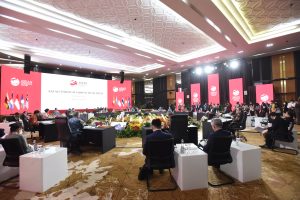We are living in a time of momentous geopolitical convulsions in which, after about three decades of apparent U.S. hegemony, superpower rivalry has returned with a vengeance. The war in Ukraine and the tensions between the Western world and China have brought back an extreme polarization in international affairs which, in the early nineties, seemed to have disappeared with the end of the Cold War and the triumph of capitalism throughout virtually the whole world, a conjuncture that an author famously described as “the end of history.”
No country or region in the world can avoid this reality, as superpower rivalries have a way of permeating virtually everything. But we can choose how we position ourselves in this brave new world. And that leads to a question that all policymakers in Southeast Asia are, or at least should be, asking themselves: which side is the Association of Southeast Asian Nations (ASEAN) on? My answer to this crucial question is very clear: none. ASEAN should stay firmly on the path of neutrality and non-alignment if it wants to keep united and play a relevant role in world affairs.
We need to learn from our own history to face the future. Our region was sucked, very much against its will, into world politics during the colonial period, when Southeast Asia became one of the main sites of confrontation between the European imperial powers, all of which conquered and subjugated different areas: Spain (and later the United States) took the Philippines; Britain took Malaya and Burma (present-day Myanmar); France took Vietnam, Laos, and Cambodia; the Netherlands took Indonesia; and Portugal conquered East Timor; while Thailand was the only country that managed to preserve its independence.
The imperialist domination of Southeast Asia unraveled during World War II, when the region turned into a crucial, and bloody, theater of yet another worldwide confrontation, this time between the Japanese empire and the Allies.
Then came the Cold War, which turned into an open and devastating conflict in large areas of Southeast Asia, particularly in Vietnam, Laos, and Cambodia. Over that period, different governments willingly took sides in the confrontation between Communism and what was then termed the “free world” of capitalism.
All these developments tore Southeast Asia apart, and now it seems almost miraculous that the five founding members of ASEAN – Indonesia, Malaysia, the Philippines, Singapore, and Thailand, which joined forces to act as a bulwark against communism – managed to add Brunei (in the 1980s), and Cambodia, Laos, Myanmar, and Vietnam in the nineties, including vastly different political systems and cultures. And, whatever its shortcomings, ASEAN could potentially be more than the sum of its parts and play a central role in world affairs. For that to happen, however, neutrality is a must.
It goes without saying that neutrality and non-alignment do not mean disengagement from world affairs or isolationism – quite the contrary. As an organization for regional cooperation, ASEAN needs to adopt a global outlook. Having established a dialogue partnership with all the permanent members of the U.N. Security Council, as well as the European Union, and not having ambitions for global hegemony, ASEAN has the potential to act as a mediator in international disputes if it manages to get its act together.
ASEAN member states have signed three important documents that reflect their will to work for common peace and prosperity: the Declaration for a Zone of Peace, Freedom and Neutrality (ZOPFAN) signed in 1971; the Treaty of Amity and Cooperation, signed in 1976; and the Treaty of Southeast Asia Nuclear Weapon Free Zone (SEANWFZ Treaty), signed in 1995. Those documents reflect the ASEAN commitment to peace, common security, and common prosperity. They should be the foundation for a truly neutral and principled position of non-alignment. Were ASEAN to take sides in superpower rivalries, it would negate its own raison d’être, as well as its aspirations to make the region and the world a peaceful habitat for all.
Given that its member states will be tempted to tilt towards one superpower or another, taking sides with either the United States or China will only serve to deepen divisions within ASEAN, thus threatening its interests, viability, and integrity. That external neutrality should not extend to regional affairs such as the crisis triggered in Myanmar by the illegal coup staged by Senior Gen. Min Aung Hlaing in February 2021, arguably the worst crisis that has afflicted the region in decades. Moreover, external neutrality would make it easier to adopt a common front to tackle such issues, as it would prevent external powers from unduly influencing the group.
ASEAN has nothing to gain from taking one side and antagonizing the other, when it can benefit from maintaining amicable and healthy relations with both. I would go further than that and I will assert that ASEAN could potentially position itself as a bridge between these two antagonists, and act as an honest mediator in their disputes.
Such a neutral role for ASEAN would be in the interests of both the United States and China. For the two superpowers to force ASEAN to take their side would be counterproductive, as it would result in an extremely negative public reaction. ASEAN should request that both the United States and China honor and guarantee its neutrality and non-alignment policy, and even declare it publicly in international fora such as the United Nations.
Under the present ASEAN chairmanship of Indonesia, a nation with an illustrious history of leading the abortive but promising non-alignment movement during the Cold War, the time is appropriate for the group to seriously think about the benefits of neutrality. ASEAN needs to own its destiny, and take a clear stand based both on ideals and pragmatism, to navigate the minefield of a world dominated by superpower rivalry. Taking sides will only serve the short-term interests of others, not of our region.

































